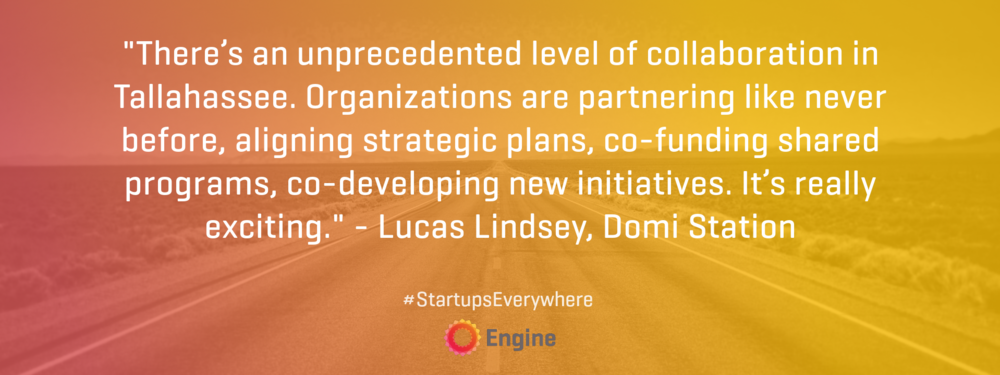Startup activity is happening in the most unlikely of places. The #StartupEverywhere series, developed by Engine, is designed to celebrate these diverse, vibrant entrepreneurial ecosystems growing across the U.S. These profiles will dive into the challenges faced by these communities and look at what sets them apart from the traditional technology hubs.
Lucas Lindsey, Executive Director of Domi Station, a Tallahassee-based entrepreneurial support organization, is all about building a diverse ecosystem in his community. This time for the #StartupEverywhere series, he talks with me about breaking down barriers, investments, diversity, grassroots movements and the impact of public policies.
What is your role in the Tallahassee startup ecosystem?
I’m the Executive Director of Domi Education, a 501(c)(3) economic development organization with a mission focused on educating and empowering entrepreneurs. We believe entrepreneurship support is the most sustainable and cost-effective economic development strategy. Our vision is to play a central role in building the most diverse startup community in the Southeast.
How does Domi support entrepreneurs?
We empower and amplify the work of others. Today Domi is a startup incubator and coworking space, but we’re always adapting to meet the needs of North Florida’s evolving ecosystem. We offer programs, resources, and events that help entrepreneurs start and scale sustainable companies. Our regional network enables us to match our members to seasoned mentors, investors, and industry advisors.
Read more on how your startup could get noticed by investors
What are some of the unique features of Tallahassee’s startup ecosystem that help it to thrive?
First, there’s an unprecedented level of collaboration in Tallahassee. Organizations are partnering like never before, aligning strategic plans, co-funding shared programs, co-developing new initiatives. It’s really exciting. Second, Tallahassee has an opportunity to lead on inclusion. By creating partnerships across organizations and neighborhoods, we have the chance to upend the stereotype of the South and build a startup community that breaks down barriers. Domi is well positioned as a central connector and collaborative broker. Finally, we have growing access to capital. A year and a half ago, the Florida Angel Nexus started a Tallahassee chapter, which has impacted our community. They’ve already invested $1.7 million across eight deals, and they’re planning to launch their own fund within the next year.
How does the post-secondary institutions (Florida A&M, Florida State, etc.) impact the ecosystem?
Tallahassee’s universities are doing excellent research and have successfully commercialized a number of technologies. Additionally, they are producing quality graduates who are passionate about technology and well prepared for roles in the startup economy. There has also been a number of grassroots movements among the students to create tech-focused groups, such as (an interdisciplinary student group that focuses on teaching people to code and product development) and HackFSU (a student-organized hackathon).
How have public policies impacted the growth of Tallahassee’s startup ecosystem?
Tallahassee and Leon County are a case study in progressive local policy support. Leon County kicked things off early on by partnering with Domi. They created a long-term affiliation agreement, renovated a centrally located warehouse that’s now home to Domi Station, abated our rent (allowing us time to develop a track record), and they’re constantly looking for opportunities to assist startups as an early client or promotional partner. The City of Tallahassee, led by Mayor Andrew Gillum, has also taken a progressive approach. They brought us a TechHire designation, have begun architecting tech workforce development programs, and launched the Tallahassee Innovation Partnership, which is a pitch series that connects startups to procurement officials in local government, state government, and higher education.
What is the biggest challenge you face in Tallahassee?
We face real challenges across the board. None are insurmountable, but each one takes strategy and vision to tackle head-on. Our biggest need is a bullpen of serial entrepreneurs with industry experience and technical chops—not easy for a small city that’s long relied on higher education and state government to fuel its economy.
What are some of the startups to watch coming out of Tallahassee?
I’m keeping my eye on:
- FullScaleNano, which has created an automated nanomaterials software that speeds up the process of analyzing images of nanomaterials.
- DivvyUp, a sustainable sock company that also gives back to those in need by donating a pair of socks to homeless shelters across the U.S. for every pair purchased.
- NewSci, which provides data insights to non-profit solutions.
- SwellCoin, a one stop shop for earning and managing loyalty points at local businesses.
- QuarryBio, which has developed an innovative method for providing high resolution analysis of protein 3-dimensional structure and binding interactions.
Read more about ecosystems around the country at Tech.Co


